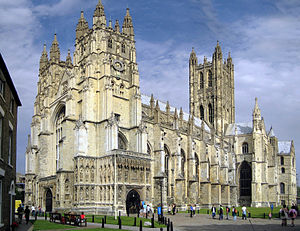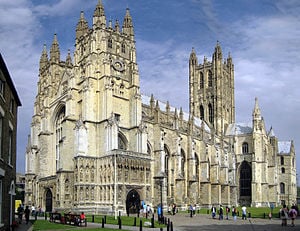I am thrilled to introduce Brad Littlejohn to Mere-O's readers. Brad is a D.Phil. candidate at Edinburgh, working with Oliver and Joan O'Donovan. He's one of the sharpest young theologians I have read. I commend the below to you, not all of which I agree with but all of which is worth your time. Read more from Brad at his blog The Sword and the Ploughshare. -MLA
Two weeks ago, the Church of England was thrown into disarray by the House of Laity's unexpected rejection of the measure introducing women bishops into the church. The measure failed by the narrowest of margins, winning 64% of the votes when two-thirds were needed, after having already gained the overwhelming support of the House of Bishops (94%) and the House of Clergy (77%). As with last month's US Presidential election, the most surprising thing about the vote was how surprising it was. The House of Laity's failure to approve the measure was greeted not merely with disappointment, but with shock, incredulity, and even outrage. Supporters of the measure had great difficulty grasping the fact that a significant number of their fellow citizens and churchgoers could actually be willing to stick with the status quo. As with the US Presidential election, this incredulity was the more odd given that nothing was changing. For an electorate to strike out in a bold new direction, embracing a political outsider or a revolutionary new measure, might well elicit surprise and incomprehension. But for an electorate to decide that it was willing to keep living with what it had already been living with for some years, while perhaps disappointing to those ready for change, should hardly be seen as an inexplicable bolt from the blue. This is particularly the case in the English church's decision. Given that for nearly 2,000 years, that church had never had women bishops, that many of its members have shown grave misgivings with the idea of women's ordination since it first became a prominent issue 40 or so years ago, and that the English are still renowned for their reflexive conservatism, a bit of hesitation on the brink before taking the plunge ought to be perceived as the most natural thing in the world, however frustrating to activists.
 Canterbury Cathedral: West Front, Nave and Central Tower. Seen from south. Image assembled from 4 photos. (Photo credit: Wikipedia)
Canterbury Cathedral: West Front, Nave and Central Tower. Seen from south. Image assembled from 4 photos. (Photo credit: Wikipedia)
That it was not so perceived betrays the collapse of British public discourse, as of American, into a fog of incomprehension; and as with the US elections, the result, far from prompting a call to self-examination and renewed engagement, has shown the losers at their worst, attacking the moral integrity of their opponents and threatening to resort to force. The progressive agenda, in short, for all of its rhetoric of dialogue, democracy, charity, and concern for minorities, has shown that it is really just interested in getting its way, and is ready to resort to bullying if that's what it takes. Even David Cameron, the Tory, declared, "the Church needs to get on with it, as it were, and get with the programme" and that it needed a "sharp prod" from Parliament. His comments were reserved, however, compared to that of many of his Parliamentary colleagues, who, suddenly aroused from their chronic apathy regarding the Established Church they are supposed to oversee, sought to outdo one another in their expressions of outrage and veiled threats. MP Diana Johnson lamented "The Church of England now stands to be left behind by the society it seeks to serve and made to look outdated, irrelevant and frankly eccentric by this decision. It appears that a broad Church is being held to ransom by a few narrow minds." MP Eleanor Laing suggested proposed disestablishment—"Does he agree that when the decision-making body of the established Church deliberately sets itself against the general principles of the society that it represents, its position as the established Church must be called into question?" while MP Chris Bryant, on the contrary, proposed making aggressive use of Parliament's legal authority over the Church—"we will have no truck with more concessions to the hard-liners who want to make women second-rate bishops. We need to speed this up. Would it not make sense to have a moratorium on the appointment of any more male bishops until there could also be women bishops—no nomination without feminisation?" MP David Winnick offered one of the most apoplectic outbursts, declaring, "this opposition to women bishops bears comparison with the opposition 100 years ago to women having the right to vote and to sit in the House of Commons? It is an anti-women attitude—a feeling that women have no place in public life, in religion or in politics—that I find contemptible," and MP Helen Goodman paradoxically blamed the vote on too many concessions to the dissenters (when the evidence suggests, rather, that it was concern about the lack of concessions, not flat opposition to women bishops, that influenced most of the "No" votes).
Much of the criticism focused on the clear injustice of a decision-making process in which a majority view could be defeated by a minority, in which a two-thirds majority of all three houses was needed for a binding decision. Of course, the irony that those whose creed is the empowerment of minorities were hell-bent on letting the majority impose its will went unnoticed, perhaps because it was nothing new. Progressivism, by its zealous fidelity to progress, can champion the cause of minorities only in order to establish new majorities, after which the old majority, now a minority, may be safely trampled underfoot. In the present case, this irony was rendered more than usually awkward by the fact that it was not the out-of-touch, hoity-toity bishops who had rejected the measure (they'd approved it almost unanimously), or even the straight-laced, narrow-minded clergy (who had passed it by a comfortable margin), but the average everyday folks in the pew, the ecclesiastical proletariat. Progressives were forced to express their solidarity with the hierarchy, and their contempt for bigoted ordinary folks. Again, however, this irony is in fact a regular feature of progressive politics, since ordinary folks are those most likely to have conservative instincts.
The overwhelming consensus, voiced only slightly more delicately by leading churchmen, was that the Church was stuck in a positively medieval attitude that was unthinkable in a 21st-century society, and that as a national church, it had a duty to modernize itself so as to mirror that wider society.
N.T. Wright offered a typically refreshing dismissal of all this nonsense in a brief essay for Fulcrum, quoting C.S. Lewis, which is always a good sign:
Login to read more
Sign in or create a free account to access Subscriber-only content.
Topics:
